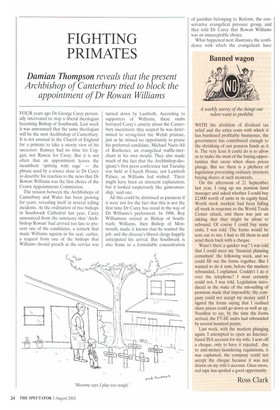Banned wagon
A weekly survey of the things our rulers want to prohibit
WITH the abolition of dividend tax relief and the extra costs with which it has burdened profitable businesses, the government has contributed enough to the shrinking of our pension funds as it is. The very least it could do is to allow us to make the most of the buying opportunities that occur when share prices plunge. But no: there is a plethora of legislation preventing ordinary investors buying shares at such moments.
On the afternoon of 21 September last year, I rang up my pension fund manager and asked whether I could buy £2,000 worth of units in its equity fund. World stock markets had been falling all week in response to the World Trade Center attack, and there was just an inkling that they might be about to rebound. Of course I could buy some units, I was told. The forms would be sent out to me; I had to fill them in and send them back with a cheque.
Wasn't there a quicker way? I was told that I could meet my 'financial planning consultant' the following week, and we could fill out the forms together. But I wanted to do it now, before the markets rebounded, I explained. Couldn't I do it over the telephone? I most certainly could not, I was told. Legislation introduced in the wake of the mis-selling of pensions made that impossible: the company could not accept my money until I signed the forms saying that I realised share prices could go down as well as up. Needless to say, by the time the forms arrived, the FT-SE index had rebounded by several hundred points.
Last week, with the markets plunging again, I attempted to open an Internetbased ISA account for my wife. I sent off a cheque, only to have it rejected: due to anti-money-laundering regulations, it was explained, the company could not accept the cheque because it was not drawn on my wife's account. Once more, red tape has spoiled a good opportunity.
Ross Clark


























































 Previous page
Previous page